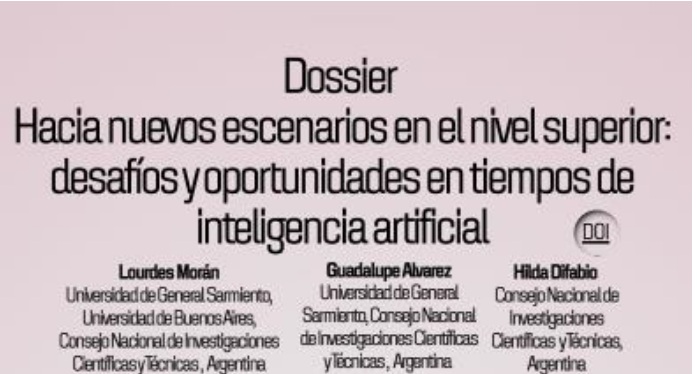Towards new scenarios at the higher level: challenges and opportunities in times of artificial intelligence
DOI:
https://doi.org/10.19137/praxiseducativa-2025-290202Abstract
This dossier, entitled "Toward New Scenarios in Higher Education: Challenges and Opportunities in the Age of Artificial Intelligence," seeks to bring together reflections and experiences on the role of AI in higher education, with the goal of thoroughly understanding the transformations this technology is generating in the field of education. In Argentina, as in other countries, the discussion about AI in higher education addresses multiple dimensions: accessibility, equity, digital skills training, and the establishment of ethical frameworks that guarantee the responsible use of these technologies. Thus, we want to explore how artificial intelligence is reshaping the teaching and learning experience, from the way content is reorganized and the dynamics between teachers and students to the ways in which knowledge is constructed in university spaces. Along the same lines, our interest lies in finding alternatives that technology offers in terms of providing access and cultivating key skills, while taking into account the methodological and ethical tensions resulting from its use. We seek to promote a critical analysis of the opportunities that intelligent systems offer to improve accessibility and foster essential digital skills in students, as well as the ethical, pedagogical, and methodological challenges they present.
Downloads

Published
Issue
Section
License
Copyright (c) 2025 Guadalupe Alvarez, Lourdes Morán, Hilda Difabio

This work is licensed under a Creative Commons Attribution-NonCommercial-ShareAlike 4.0 International License.
Copyright Notice
Editorial Committee Educational Praxis Magazine:
I hereby declare that I am the author of the article titled (article name), that it is original and my own and that it was not previously published in any other format or medium. I declare to know that the magazine will not charge me any type of fee under any circumstances, nor will I receive any type of monetary compensation If it were accepted for publication in Educational Praxis, I authorize the aforementioned magazine to publish it digitally and to advertise it on its social networks.
If the work is published, I adhere to the Creative Commons license called "Attribution - Non-Commercial Share Alike CC BY-NC-SA", through which it is allowed to copy, reproduce, distribute, publicly communicate the work and generate derivative works, as long as when the original author is cited and acknowledged. This license has been used since September 2018. In 2016 CC BY NC ND 4.0 was adhered to; and in the years 2017 and 2018 (January-August) CC BY NC 4.0.
This CC BY-NC-SA Share Alike license does not, however, permit commercial use of the work. As an author, the journal may establish additional agreements for the non-exclusive distribution of the version of the work published in the journal, it allows me to self-archive the published articles, in their post-print version, in institutional, thematic repositories, personal web pages or any other relevant use. with the recognition of having been first published in this journal.
Educational Praxis adheres to DORA (Declaration on Research Assessment) signed in San Francisco, California, on December 16, 2012, and to the Declaration of Mexico (Joint Declaration LATINDEX - REDALYC - CLACSO - IBICT).














_(1)2.png)


3.png)











_(2).png)






2.jpg)









